Prior Readings
2010: Do Androids Dream of Electric Sheep? by Philip K. Dick
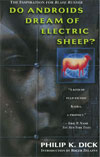 The Cornell community takes a leap into the future with the 2010 New Student Reading Project, which will focus on Philip K. Dick’s 1968 science fiction novel, “Do Androids Dream of Electric Sheep?” — the basis for Ridley Scott’s 1982 film “Blade Runner” and an influential work of post-apocalyptic fiction.
The Cornell community takes a leap into the future with the 2010 New Student Reading Project, which will focus on Philip K. Dick’s 1968 science fiction novel, “Do Androids Dream of Electric Sheep?” — the basis for Ridley Scott’s 1982 film “Blade Runner” and an influential work of post-apocalyptic fiction.
“[The book] generates a range of engaging topics for discussion and exploration, including technology, artificial intelligence, the environment, the future, the human, the real (as opposed to the artificial), the idea of design or creation, the status of art and the ineluctable force of entropy,” wrote Laura Brown, vice provost for undergraduate education, in a letter to deans and vice provosts announcing the selection. more..
2009: The Grapes of Wrath by John Steinbeck
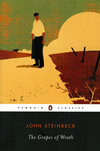 “The Grapes of Wrath,” John Steinbeck’s once-controversial and now-classic 1939 novel of Dust Bowl refugees who struggle to make a new life in California, is the 2009 selection for Cornell’s New Student Reading Project.
“The Grapes of Wrath,” John Steinbeck’s once-controversial and now-classic 1939 novel of Dust Bowl refugees who struggle to make a new life in California, is the 2009 selection for Cornell’s New Student Reading Project.
“It is an extraordinarily rich account of major economic and social upheaval during a pivotal era in American history,” said Michele Moody-Adams, Cornell vice provost for undergraduate education. She added that the book has a special relevance in a year of deep economic recession. “The book makes us reflect on the causes and effects of widespread homelessness and unemployment, the nature of economic and social justice, and the consequences of taking the vibrancy of the natural world for granted. It’s a good thing for undergraduates to have to confront these questions at the current moment.” The book will be read by much of the Cornell community, including the entire incoming freshman class, new transfer students and those faculty and staff who will lead reading groups during student orientation in late August. The greater Ithaca community will also participate, with support from the Tompkins County Public Library, a Reading Project partner. more…
2008: Lincoln at Gettysburg by Garry Wills
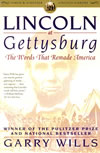 Cornell’s 2008 incoming class and much of the rest of the Cornell community read Gary Wills’ Pulitzer Prize-winning book, Lincoln at Gettysburg: The Words That Remade America, as part of the 2008-09 New Student Reading Project. The selection was announced by Michele Moody-Adams, vice provost for undergraduate education.
Cornell’s 2008 incoming class and much of the rest of the Cornell community read Gary Wills’ Pulitzer Prize-winning book, Lincoln at Gettysburg: The Words That Remade America, as part of the 2008-09 New Student Reading Project. The selection was announced by Michele Moody-Adams, vice provost for undergraduate education.
Lincoln’s 272-word address at Gettysburg, Pa., the site of the 1863 battle that was the turning point of the Civil War, has “become a symbol of national purpose, pride and ideals,” Wills writes. “The power of words has rarely been given a more compelling demonstration.”
Lincoln at Gettysburg invites readers to reflect on the ideals that should shape America’s national purpose and allows them to consider the political implications of race, the nature of leadership, the challenge of commemorating the sacrifices of those who fight in a contested war, the bearing of the past on the present and the dynamics of politics, according to Moody-Adams. Wills’ book is a compelling work of history and a rich and illuminating analysis of the power of effective communication and well-crafted political rhetoric, she said.
2007: The Pickup by Nadine Gordimer
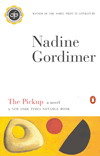 In the Summer of 2007, Cornell’s incoming undergraduate class read The Pickup, a novel published in 2001 by Nobel Laureate Nadine Gordimer. Much of Gordimer’s work has explored the political, psychological and moral complexities of South African racial apartheid.
In the Summer of 2007, Cornell’s incoming undergraduate class read The Pickup, a novel published in 2001 by Nobel Laureate Nadine Gordimer. Much of Gordimer’s work has explored the political, psychological and moral complexities of South African racial apartheid.
The Pickup has been widely recognized as an accomplished work of contemporary fiction. It was recently selected as a featured book for discussion by the Great Books Foundation, was awarded the 2002 Commonwealth Writers’ Prize and was included on a shortlist for the 2001 Man Booker Prize.
2006: The Great Gatbsy by F. Scott Fitzgerald
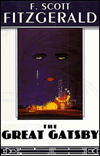
The Great Gatsby “tells a good story about memorable — if not always likeable — characters, and it does so in evocative and beautiful prose that deftly brings the Jazz Age to life,” said Michele Moody-Adams. Reading Fitzgerald’s novel, she added, “also provides an opportunity to reflect on the complexity of many defining American ideals, on the ethical and social implications of unchecked materialism, and on the potentially corrosive effects of unregulated desire.”
“We have taken all these strengths of the book into consideration in choosing The Great Gatsby as the freshman book for the Fall of 2006. We expect the book to be a worthy object of reflection and discussion for our incoming students and the campus at large, as well as for those members of the surrounding community who plan to join in the reading project once again.”
2005: Things Fall Apart by Chinua Achebe
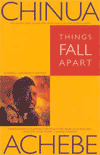 Recognized now as a classic of world literature, Things Fall Apart was written in 1958 and depicts traditional village life in Nigeria during the imposition of British colonial rule in the late Nineteenth Century.
Recognized now as a classic of world literature, Things Fall Apart was written in 1958 and depicts traditional village life in Nigeria during the imposition of British colonial rule in the late Nineteenth Century.
In 2005 nearly 5,000 students from 67 high schools in 18 New York counties and New York City read Things Fall Apart as part of a statewide pilot program coordinated through Cornell Cooperative Extension (CCE).
2004: The Trial by Franz Kafka
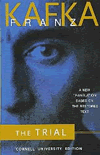 The Trial is Kafka’s prescient masterpiece that raises fundamental questions about the nature of justice and the role of the state. New students, alumni and the Ithaca community took part in this year’s events including a debate hosted by the local bar association on The Trial.
The Trial is Kafka’s prescient masterpiece that raises fundamental questions about the nature of justice and the role of the state. New students, alumni and the Ithaca community took part in this year’s events including a debate hosted by the local bar association on The Trial.
2003: Antigone by Sophocles
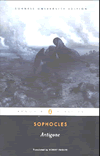 Antigone is a timeless text. The Tompkins County Public Library and Cornell continued the tradition, the annual town-gown celebration of reading and of having conversations with each other about ideas that began with Frankenstein. In 2003, Tompkins County 10th-grade students were recipients of copies of Antigone and were treated to David Feldshuh’s brilliant new translation and adaptation of Antigone performed at Cornell’s Schwartz Center for the Performing Arts.
Antigone is a timeless text. The Tompkins County Public Library and Cornell continued the tradition, the annual town-gown celebration of reading and of having conversations with each other about ideas that began with Frankenstein. In 2003, Tompkins County 10th-grade students were recipients of copies of Antigone and were treated to David Feldshuh’s brilliant new translation and adaptation of Antigone performed at Cornell’s Schwartz Center for the Performing Arts.
2002: Frankenstein by Mary Shelley
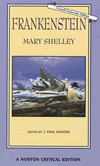 In 2002 Cornell selected Frankenstein, a book that raised important questions on ethics, creativity and the nature of our humanity. Cornell gave over 1,500 free copies of Frankenstein to the Tompkins County Library, to county high schools, to senior citizens centers and to other civic organizations thus beginning the “tradition” of the “town-gown” read.
In 2002 Cornell selected Frankenstein, a book that raised important questions on ethics, creativity and the nature of our humanity. Cornell gave over 1,500 free copies of Frankenstein to the Tompkins County Library, to county high schools, to senior citizens centers and to other civic organizations thus beginning the “tradition” of the “town-gown” read.
2001: Guns, Germs and Steel by Jared Diamond
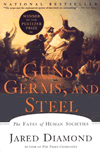 The Cornell New Student Reading Project began in 2001 with Jared Diamond’s Pulitzer-prize winning book, Guns, Germs and Steel. This provocative work explores the differences in rates of development among races, societies and world cultures as a function of geographical and environmental circumstances.
The Cornell New Student Reading Project began in 2001 with Jared Diamond’s Pulitzer-prize winning book, Guns, Germs and Steel. This provocative work explores the differences in rates of development among races, societies and world cultures as a function of geographical and environmental circumstances.
